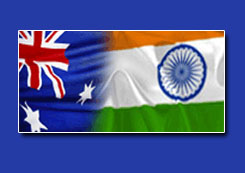India, Australia take steps to initiate a knowledge partnership
 New Delhi, Nov. 13 : India and Australia on Thursday agreed that there was a need for building a broad knowledge partnership, ranging from developing collaborative projects in education from primary school up to university, to conducting joint research in many fields. Science and technology cooperation is a critical part of this partnership.
New Delhi, Nov. 13 : India and Australia on Thursday agreed that there was a need for building a broad knowledge partnership, ranging from developing collaborative projects in education from primary school up to university, to conducting joint research in many fields. Science and technology cooperation is a critical part of this partnership.
According to a joint statement issued at Hyderabad House here after delegation-level talks, the Prime Ministers'' of the two countries -- Dr. Manmohan Singh and Kevin Rudd -- acknowledged the important role science plays in the bilateral relationship and the potential to work more closely in this area of shared strength.
Building on the success of the Australia-India Strategic Research Fund, Australia said it will increase its commitment to bilateral research efforts to Australian dollars ten million per year for the next five years, which will be matched by India.
Both leaders said the expanded fund will introduce a new ''grand challenge'' component, which will support large-scale research projects designed to deliver practical solutions to some of the major challenges shared by both countries.
They said the areas of focus will be “energy”, “food and water security”, “health” and “the environment”.
They also said that the expanded fund will also introduce a substantial new fellowship program, comprising exchanges for early-career researchers from both countries and short-term visits by senior scientists, and added that both governments will continue to support leading-edge research in areas, including in information and communication technology, micro-electronic devices and materials, earth sciences, nanotechnology, astronomy and biotechnology.
The two Prime Ministers'' welcomed the recent agreement that India and Australia would hold an annual ministerial dialogue on education, which would include representatives from education institutions and industry. Mr Rudd welcomed India’s proposal to revive Nalanda University.
Dr. Singh conveyed the high priority that the Government of India attaches to the safety, security and well-being of the Indian community in Australia.
Mr. Rudd reiterated that Australia had a zero tolerance approach to violence and was committed to taking all possible measures to protect the safety and welfare of all international students including Indian students.
He provided Dr Singh with an update on the efforts of the Australian Government and its state government counterparts to enhance law enforcement, extend student welfare measures, re-register all education providers, audit vocational education and training institutions, and strengthen the integrity of the visa system.
On cultural ties both leaders said it was vibrant and expanding.
The Prime Ministers'' agreed that strengthening these enduring people-to-people links to enhance mutual understanding is vital to the future of the relationship.
In 2010, India will host a ''Days of India'' cultural event in seven Australian cities.
The Australia International Cultural Council has selected India as the focus country for a major year-long cultural program in 2012.
The two Prime Ministers welcomed the decision to launch negotiations on a film co-production agreement covering a wide range of audio visual formats.
They also agreed that sport has long occupied an important place in the India-Australia relationship.
Rudd said that Australia is looking forward to participating in the Delhi 2010 Commonwealth Games and is supporting the preparations.
The Australian Sports Outreach Program will be boosted to deliver more grass-roots sports-based activities to India’s youth, women and people with a disability, in collaboration with Indian partners, he added. (ANI)